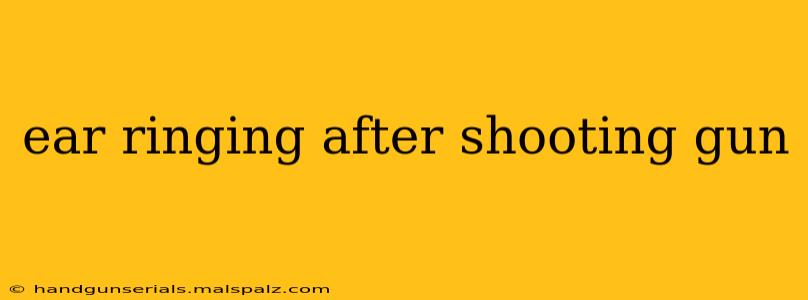Experiencing ear ringing, also known as tinnitus, after shooting a gun is a common occurrence, but it's crucial to understand its implications and take preventative measures. The intense noise generated by firearms can cause temporary or permanent hearing damage, even with seemingly brief exposure. This post explores the causes of post-shooting tinnitus, its severity, and crucial steps to protect your hearing.
Understanding the Link Between Gunfire and Tinnitus
The high-decibel sound produced by firearms is the primary culprit behind post-shooting tinnitus. Each gunshot generates a powerful sound wave that travels to the inner ear, potentially damaging delicate hair cells responsible for hearing. These hair cells don't regenerate, leading to permanent hearing loss in severe cases. Even sounds that don't cause immediate pain can gradually accumulate damage over time, culminating in persistent tinnitus.
Factors Influencing Hearing Damage from Gunfire
Several factors influence the extent of hearing damage caused by gunfire:
- Type of Firearm: Different firearms produce varying decibel levels. High-powered rifles and shotguns generally generate significantly louder sounds than handguns.
- Distance from the Firearm: Proximity to the firearm directly impacts the intensity of the sound waves reaching your ears. The closer you are, the greater the risk of damage.
- Duration of Exposure: Repeated exposure to gunfire, even at lower decibel levels, increases the cumulative risk of hearing damage and persistent tinnitus.
- Hearing Protection: The use of appropriate hearing protection, such as earplugs or earmuffs, is the most effective method to mitigate the risk of hearing damage.
Types and Severity of Tinnitus After Shooting
Tinnitus after shooting can manifest in different ways, ranging from a subtle ringing or buzzing to a loud, high-pitched whine. The severity varies depending on the factors mentioned above.
- Temporary Tinnitus: This is a common experience after exposure to loud noise, including gunfire. The ringing typically subsides within a few hours or days. While temporary, it's still a warning sign that your hearing has been stressed.
- Permanent Tinnitus: Prolonged or intense exposure to loud noise can lead to permanent tinnitus. This persistent ringing or buzzing can significantly impact quality of life, leading to sleep disturbances, difficulty concentrating, and even anxiety or depression.
Protecting Your Hearing at the Shooting Range and Beyond
Preventing hearing damage is paramount. The following strategies can significantly reduce your risk of experiencing tinnitus after shooting:
Invest in High-Quality Hearing Protection
- Earmuffs: Offer superior noise reduction compared to earplugs, especially at higher decibel levels.
- Earplugs: Provide excellent protection when used correctly. Choose high-fidelity earplugs designed for shooting sports to minimize sound distortion while effectively reducing noise levels.
- Combination Approach: Using both earmuffs and earplugs provides the best protection.
Follow Safe Shooting Practices
- Maintain a Safe Distance: Never stand too close to the firearm when it's being discharged.
- Use a Muzzle Brake (if applicable): Muzzle brakes can reduce recoil and potentially lower the noise level.
- Limit Exposure: Take breaks during extended shooting sessions to allow your ears to recover.
When to Seek Medical Attention
If you experience tinnitus after shooting, even if it's temporary, it's advisable to monitor the situation. If the ringing persists for more than a few days, intensifies, or is accompanied by other symptoms like hearing loss or dizziness, seek immediate medical attention from an audiologist or ENT specialist. Early intervention can help prevent permanent hearing damage.
Disclaimer: This information is intended for educational purposes only and does not constitute medical advice. Always consult a qualified healthcare professional for any health concerns.

